by Monika Mandal
Indian Farm Bills Seen as “Black Laws”
The three farm bills that the Indian central government passed, first as ordinances in June 2020 and then as bills in September 2020, are commonly referred to here in India as, “Kala Kanoon” (Black Laws). While the government insists that the laws are for the welfare of farmers, the beneficiary party do not think so. A “rail roko” (rail blockade) was organised by the farmers in September 2020 as soon as the laws were passed, but it did not resolve the issues between the farmers and the government. Even after state bands (strikes), many talks and demonstrations, the government has been deaf to the demands made by the people of India.
Famers Gather at Delhi Borders
Since November 25-26, 2020, farmers all across the country— especially those from Punjab and Haryana – have gathered at the borders of Delhi requesting the government repeal the three bills. The main protest sites are at two entrances to Delhi — one at the Tikri Border and another at the Singhu Border. These protest sites are barricaded and there are few entry points into the protest areas. To get into the Tikri Border site, one has to maneuver around a zig zag of iron police barricades, ill-drained streets, and shabby houses. Passing a ground about the size of half a football stadium, a huge stage marks the beginning of the protest crowd which stretches 5-7 km long.
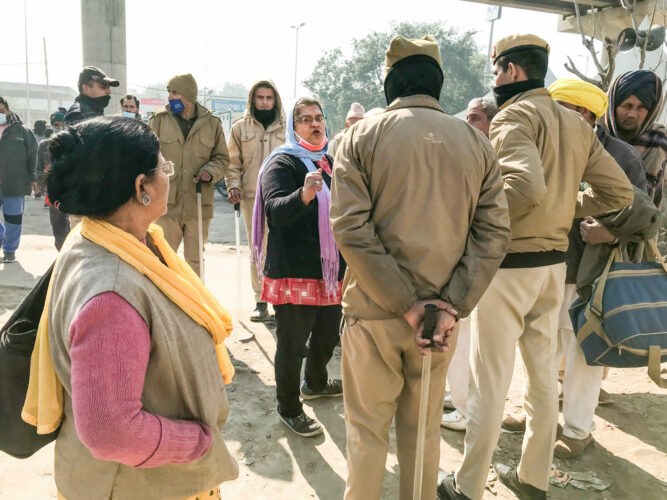
As I enter the Tikri Border premises, I see two women arguing with a few police personnel. Though the argument is quiet, calm, and composed, one could sense the confidence with which the women were asserting their demands. Twenty seven years old, Sonia of Jalandhar, Punjab, is one of the women demanding that entrance to the premises should be kept open for women at night. She stays with her relatives in Delhi and visits the Tikri border protest site everyday, like many other men and women.
Women on Hunger Strike
Participation of women and the youth at the protest has made it an absolute people’s movement. This can be see at the protest stage. Here, there is an unusual scene. Twelve women are seated at the stage with garlands around their neck and a crowd of men are sitting on the ground.
“After a week since the protest began, we told the male protestors that we also want to participate in the fast,” tells me 35 year old Harjeet Kaur from Punjab. Everyday since then women and men have been sitting on the stage for 24 hour fasts.
“We are adamant and will not go anywhere until the laws are repealed”, says 74 year old Sukhvinder Kaur from the main stage, where she is fasting with other female companions.
The women’s green, yellow, and saffron coloured dupattas, which once may have been seen as signs of vulnerability or obedience to customs, now take on different symbolism. The pieces of cloth have been elevated into flags of resistance and revolution, signaling unity among the farming community.
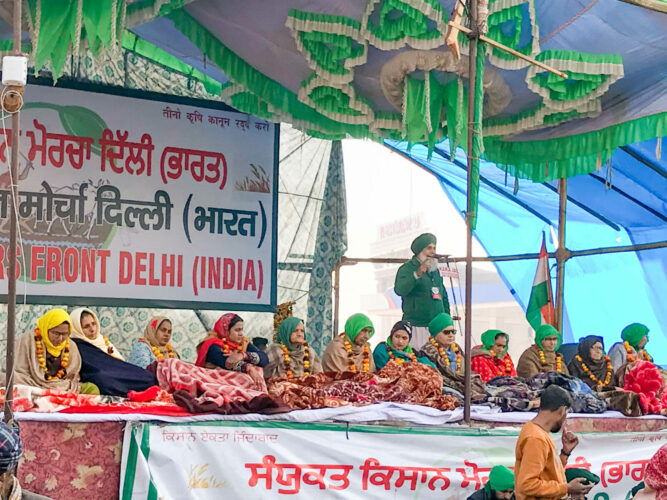
“We are witnessing a constantly increasing participation by common people in the farmers’ protests. More women and young people are joining these morchas (protests) every day,” Joginder Singh Ugrahan, the president of the Bhartiya Kisan Union, informed the press. Though the number of men in the crowd is visibly larger, the courage and excitement of women compensates for their smaller numbers. The women here not only listen, but also lead.
Shifting Gender Roles
There is something different about these farm protests when compared to other protests. The sites not only smell of courage and power of common people, but the fearless women here fill the air with a sense of revolution.
The fearless women here fill the air with a sense of revolution.
These women have left the conventional kitchen role and can be seen at every possible sector beyond the kitchens. The orthodox gender based identities seem to have diluted in the crowd of the protest. Scenes of men chopping onions, peeling potatoes, and washing cauliflowers is very common. Apart from taking the roles and responsibilities in the kitchen, women can also be seen holding flags, distributing pamphlets and papers, voicing opinions, shouting slogans, and openly criticising the government.
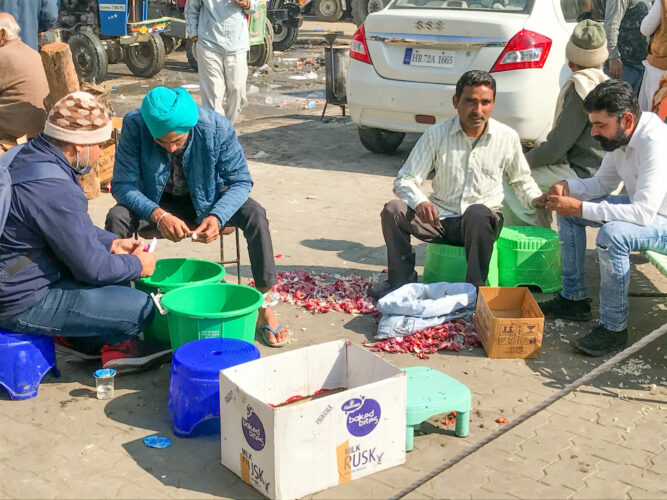
With the slogan, “Kale kanoon wapas lo, hum nahi darenge, dattey darenge. (Take the black farm laws back; we will not move ’till the farms are taken back), Amandeep Kaur leads a group of men through the streets. Amandeep came to participate at the protest from Faridkort, Punjab in the beginning of December 2020 and has been here since then.
A few days earlier, the Chief Justice of India (CJI) urged women and children at the protest to leave the site and return home, in the name of safety. In response, Ritu Lather (22 years old) confidently raises her voice to emphasis, “We are here to fight for our rights, for the rights of our fathers, brothers, ancestors, and family. Nobody needs to tell us what we should do. We fight or we die.”
Nobody needs to tell us what we should do.
We fight or we die.
A bunch of women got down from a truck along with Ritu. She informs me that females from her village travel 90 km every day to meet their family members who have been living at the site since November 2020. About five tractors came from Ritu’s village— Buddha Khera Lather in Haryana. Ritu’s example is not an exception. Ever since the ordinance took the shape of laws, many people have been voluntarily joining the farmers. Everyday, tractors and buses loaded with young girls, women, and children turn up at the protest sites. These women make regular visits to the protest site, apart from looking after the harvest and the sowing season at home.
Sukhbinder Kaur (55 years old) draped in a yellow dupatta, has pain in her voice. She is the only farmer in her family, without any male members. She talked with me as she moved her dupatta and fixed her kisan morcha (farmer protest) flag, which she was carrying to the site to join her friends.
Women in Different Roles
At the satyagrahas (nonviolent civil resistance) of Singhu and Tikri border— women cook, manage accounts, tend to the ill, mind children, drive tractors, chant slogan, and give speeches. They are also involved in creative practices to propagate messages of revolution by singing, doing theatre, and speaking with the media.
Providing Medical & Health Services
“We are here to serve everyone, no matter if they are part of the protest or not”, says Asha, who volunteers at one of the medical camps that address health emergencies. Asha tells me with pride, “The doctor, nurse, and pharmacist at this camp are all women and we are no less than anyone else.”
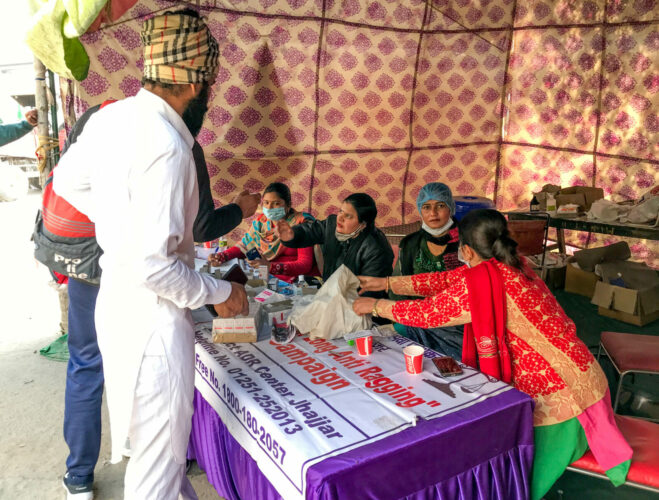
There are medical camps every few meters at the protest site. A few are organised by the government, but a majority are being operated by non-governmental organisations, private sector organisations, and Khalsa Aid.
Women here are catering not only to the needs of the general public, but also to women’s sanitation needs. Women’s undergarments and sanitary napkins are available at most of these medical counters and the presence of women here makes it easy and comfortable for other women to access the services.
Women Ensure Peace & Security
Women are also ensuring peace and security at the protest. I met Constable Poonam while she was taking a tea break with her crew. She informs me, “We make sure that women and children are safe here. More than 25 women police personnel are on duty in this area of the protest ground from 7am – 7pm, everyday. We have observed no ill behaviour or peace disruption in any manner at these grounds, ever.”
Honoring Women
Women — such as those from villages like Ugrahan, in Sangrur district – have been singing siappas (mourning songs). I found 44 year old Rajvinder Kaur addressing her women troop, “This is just as much an attack on our chulahs (ovens). What will we eat if our lands are at the mercy of powerful private corporations like those of Ambani and Adani? We cannot sit back and allow only the men to fight for us. We fight for ourself. We will not move until the laws are repealed.”
We cannot sit back and allow only men to fight for us. We fight for ourself.
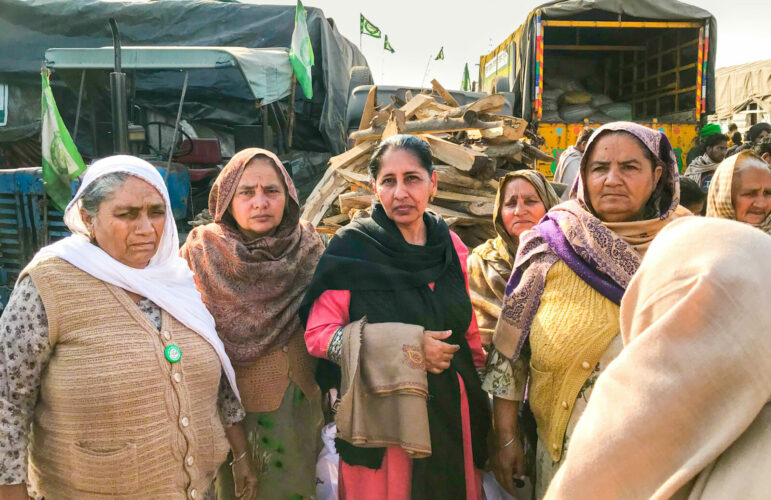
To honour the participation of women, farmers declared 18 January 2020 as Mahila Kisan Diwas (Women Farmers’ Day). “We could not have achieved what we did in the last few months without the support from the women we have here,” tells me Jasdeep Sekhon, a young farmer from Haryana.
While the farmers and the protesters have seen women in a new light, women are still fighting patriarchal mindsets. The women here are aware that they are not only fighting the government but also the age old stereotypes and the patriarchy. One beautiful thing to feel here is the cooperation of every gender and age group to give each other as much stage time as they deserve.
About the Author
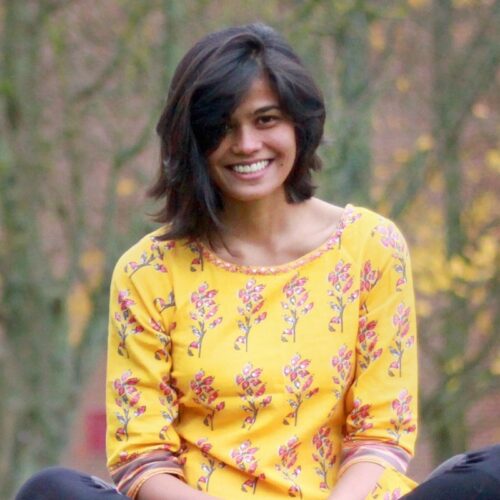
Monika Mondal is an independent journalist based in slum of New Delhi. Her works mainly feature issues around agriculture, environment, and climate change. When not working, she can be found writing a book on environmental injustice. Find more of her work here.

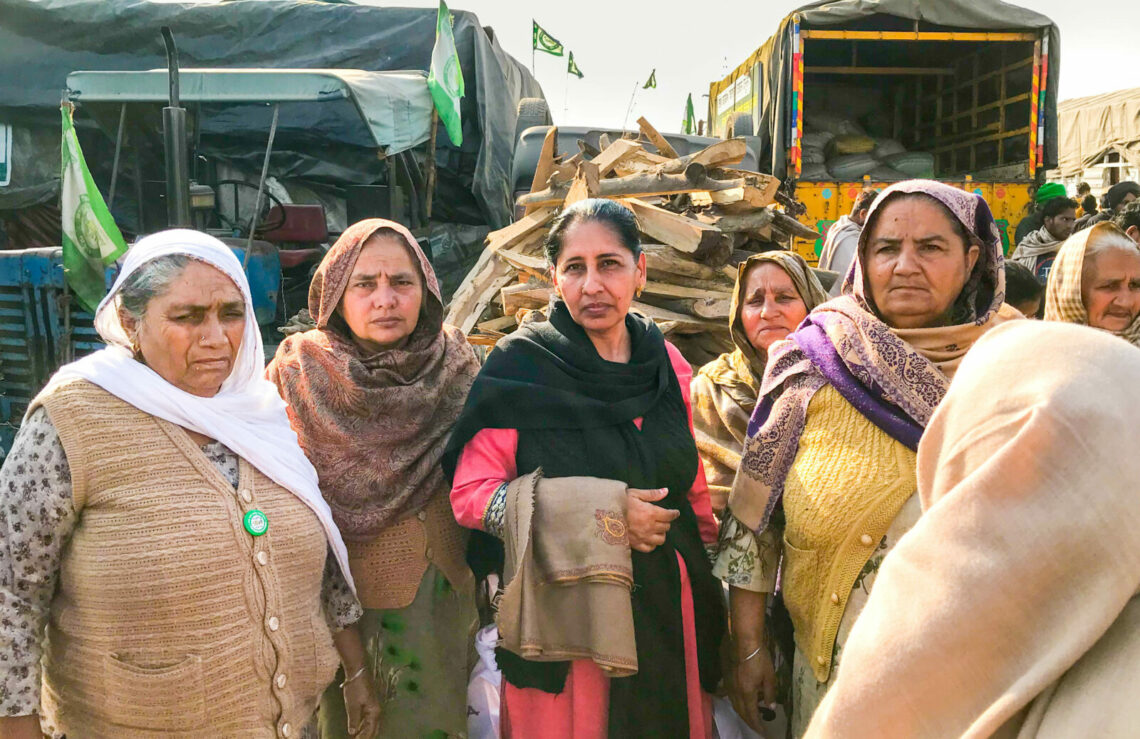
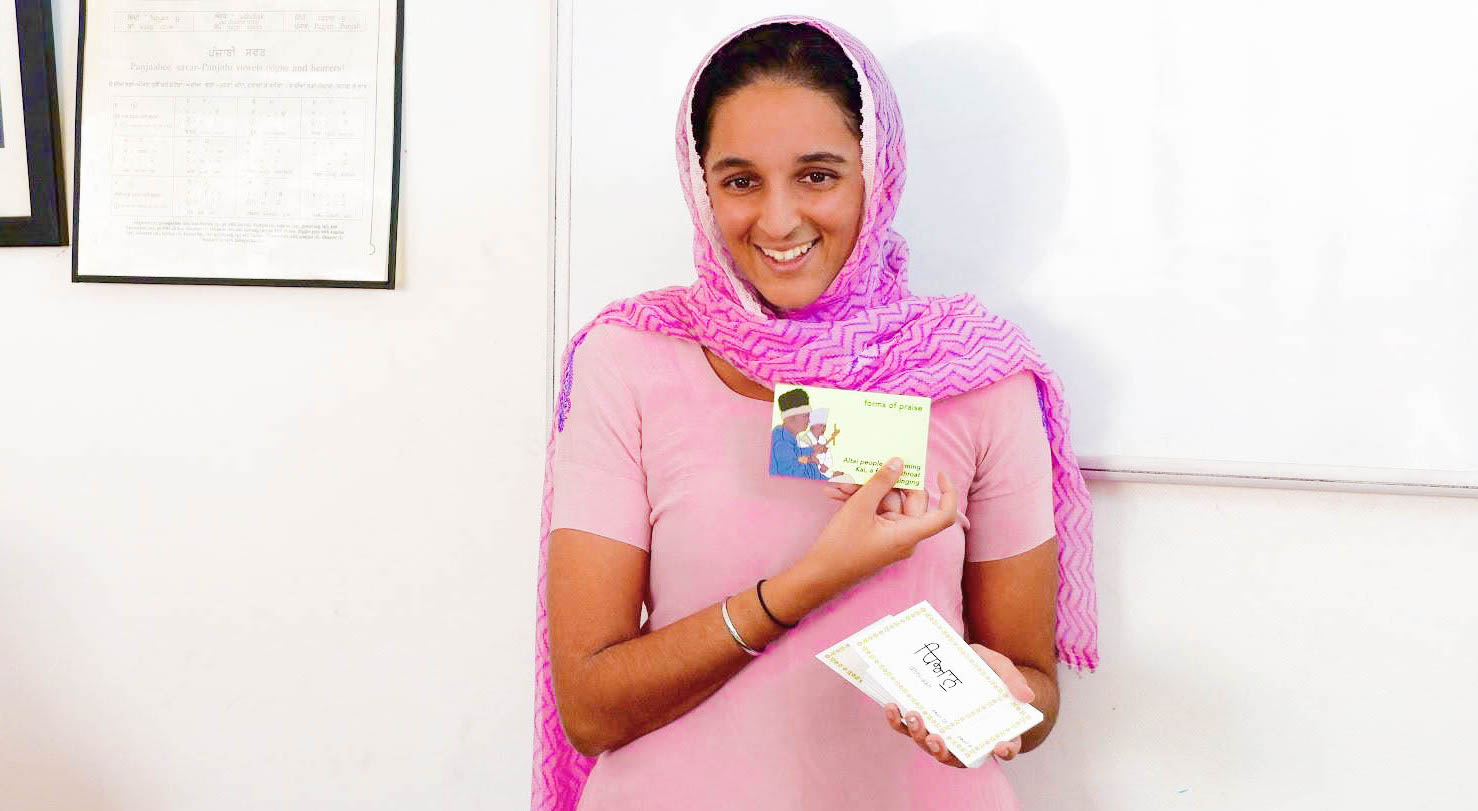

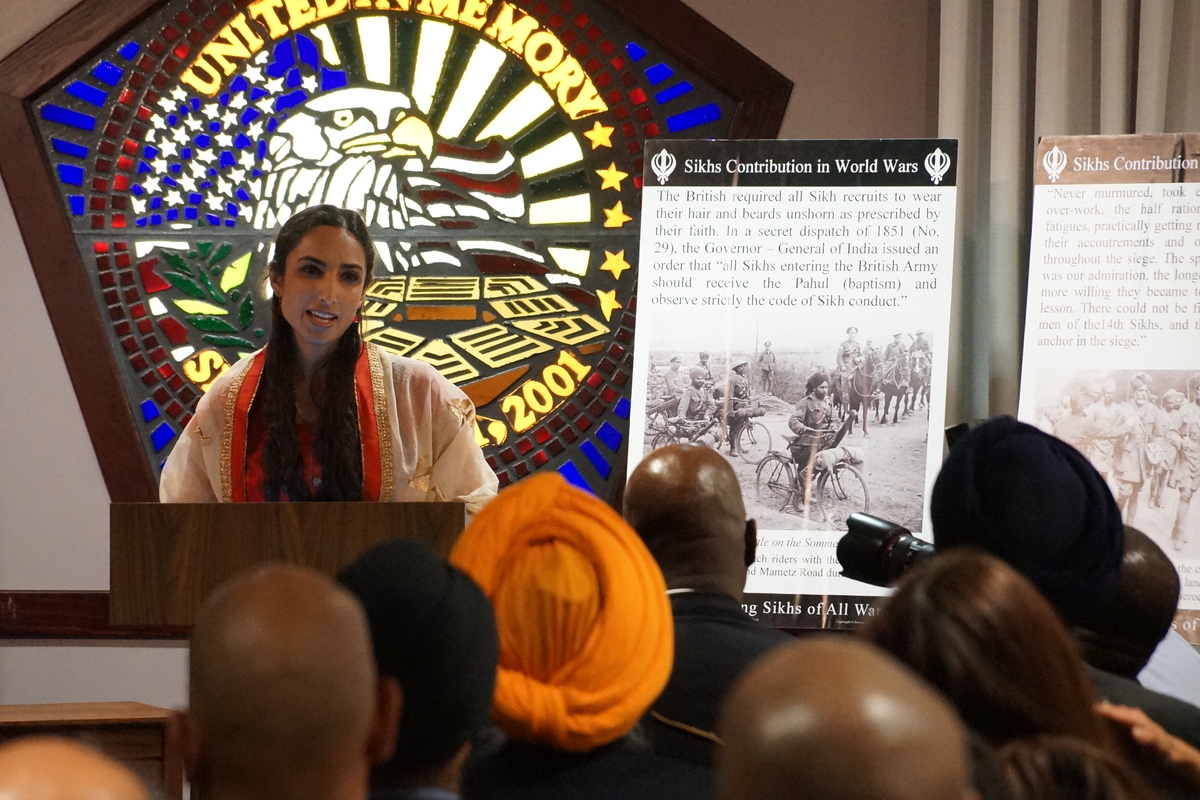
No Comments